Missile sirens, research resolve: Ukrainians at Berkeley reflect on a year at war
Since Russia's invasion a year ago, Ukrainian students at Berkeley have started nonprofits, committed to research and delivered aid to the front lines.
February 28, 2023

In Irpin, Ukraine, north of Kyiv, the Ukrainian national flag and war flag wave in front of destroyed buildings on Feb. 25, 2023. (AP/Sipa photo by Kish Kim)
A year ago, Dmytro Tymoshchenko was near the homestretch of Berkeley Law’s Master of Laws program for foreign lawyers. Already general counsel for two international firms in Ukraine, he paused his coursework because of the pandemic. He had his sights set on resuming in May.
Then, Russia’s bombs rained down near his home 20 miles outside of Kyiv.
The shelling was relentless. Blackouts were constant. So were fears of Russia taking control of the territory. Forced to further suspend his studies, Tymoshchenko began assembling survival kits loaded with fuel, radios and sensors that detect radiation from possible nuclear weapons.
Like many UC Berkeley students with ties to Ukraine, Tymoshchenko hoped the war would be short-lived. Much has changed since several of them told Berkeley News one month after Russia’s invasion about their looming dread and their steadfast hope.
Berkeley News recently reconnected with five students it profiled early last year. Some, like Tymoshchenko, withdrew from their studies. Others began splitting their time between Berkeley and Ukraine, where they can better aid the war effort. Many are finding renewed purpose in their chosen academic fields, which span economics, history, law and architecture.
“Together, we come through all the hardships,” Tymoshchenko said. “Same with my parents. Same with my company. Same with every other Ukrainian.”
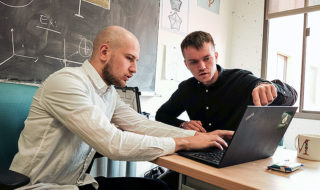
Berkeley Ph.D. students Igor Molybog (left) and Maksym Zubkov, both Ukrainian, discussing strategy for using volunteer networks to distribute food and medicine to people who can’t flee Ukrainian hotspots. (Photo by Sofia Liashcheva | UC Berkeley)
Sleepless nights, a nonprofit and a trip to Ukraine
Max Zubkov stopped eating after the invasion.
Born in Ukraine in 1992, Zubkov grew up near Odesa before leaving in 2013 to join his mother and stepfather in the U.S. He’s a U.S. citizen and in his fifth year as a Ph.D. student studying mathematics at Berkeley. Though he was at Berkeley when the fighting began, Zubkov had been in Ukraine just a month earlier, in January 2022, visiting friends and family.
The distance from home and the uncertainty of what might happen to his family made him feel helpless. Amid sleepless nights and stress-filled days, Zubkov lost 14 pounds. He wanted to help, even if he was 6,000 miles away.
“I woke up every day scared that my brother, dad and friends had been hit by a bomb,” Zubkov said. “I was not able to sit still and watch while people were dying, so I looked for well-organized NGOs I could contribute to.”
He grew frustrated with the options. Many relief organizations lacked transparency in how the money would be spent, he said. There seemed to be disinterest in streamlined logistics, he said, and some groups even exuded “indifference to the plight of humans.”
So, he created his own nonprofit, which is structured more like a startup. He called it Support Ukraine With Us. Efficiency, transparency and flexibility became its ethos, he said. Within 12 hours of receiving the first donation, the nonprofit directed money to help a family who had just lost a husband and father.
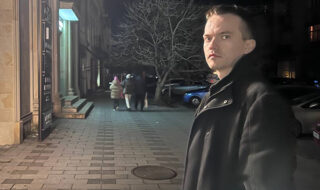
Max Zubkov spent six months in Ukraine last year, a trip rife with power outages and missile sirens. Here, he walks in downtown Kyiv to find a coworking space with a generator so he could get in touch with friends and family and to do work for his nonprofit, Support Ukraine With Us. (Photo courtesy Max Zubkov)
At the end of the summer, Zubkov traveled back to Ukraine to scale up the effort, which purchases and delivers humanitarian aid to those most affected by the war. Support Ukraine With Us has raised about $150,000 in the past year — a third of the contributions are from the past two months alone, he said.
Spending fall and winter in Ukraine was “terrifying” at times, he said. Missile alert sirens would wake him in the middle of the night, followed by the sound of bombs exploding nearby.
“I felt disheartened along with the people of Ukraine,” he said, “except I knew I had a way out and the rest did not.”
Zubkov is back at Berkeley after six months in Ukraine. Last week, he arranged for the Ukrainian national anthem to be played at noon on the carillon in the Campanile. The music commemorated the first anniversary of the invasion.
“I had mixed feelings listening to the Ukrainian anthem,” Zubkov said. “On one hand, it was great to get the acknowledgment of the war from UC Berkeley. On the other hand, it was a stark reminder of the dire situation in my homeland.”
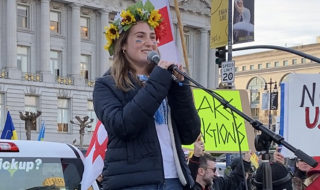
In the days after Russia invaded Ukraine, Marina Mezhibovsky spoke to a large pro-Ukraine rally in front of San Francisco City Hall. (Image from a video by Mikola Bilogorskiy)
Part activist, part architect, she finds her voice
Marina Mezhibovsky is torn. The images and stories coming out of her family’s homeland have been nothing short of traumatizing for the second-year student studying architecture. But the prolonged nature of the war and Mezhibovsky’s distance from the conflict have forced her to go about her daily life.
“That is definitely something I struggle with, because the shock I felt last year has worn off, and it is just a reality I feel like we have all accepted,” she said. “This doesn’t just pertain to Russia’s invasion of Ukraine. But it’s always hard for me to understand how we can carry on with our lives as usual while these things happen around the world.”
While Mezhibovsky was born in San Francisco, her parents hail from Ukraine and have been active in Bay Area Ukrainian affairs for much of her life. Ukrainian culture surrounded her, too, though she didn’t draw as strict of a line between her country and Russia — at least not until her sobbing mother called the night of the invasion.
She’s since spoken at rallies and helped to organize fundraising efforts on campus. Mezhibovsky helped create the group Berkeley With Ukraine as well as a separate social group called the Borsch Club that puts together events rooted in Ukrainian culture.

Marina Mezhibovsky, a second-year architecture student, helped organize groups and rallies in support of Ukraine, including this March 2022 rally on campus. (Photo courtesy Marina Mezhibovsky)
“Seeing everyone’s efforts come together to help Ukraine has been amazing,” she said.
Mezhibovsky spent a summer in Ukraine before the war, where she visited her parents’ hometown of Kyiv, as well as Lviv to the west. The war has given her a better understanding of trauma. Knowing that longtime family friends are in danger has been difficult.
“It is one thing to hear about a devastating event that is happening somewhere in the world, but another to know and worry about the people it is currently affecting,” she said. “For that reason, Russia’s invasion of Ukraine has made me more cognizant than ever of trauma around the world.”
Mezhibovsky said her Ukrainian identity has grown since the start of the war. She sees a role for herself: Infrastructure needs to be rebuilt. Buildings must rise again. Such monumental tasks have opened her eyes to what her own future might look like. Mezhibovsky is studying architecture, after all.
“As an aspiring architect,” she said, “I see the work that will need to be done as an opportunity to turn the cities that were destroyed by Russia into sustainable modern spaces that can pave the way for the rest of the world towards a more sustainable future.”
Renewed purpose as a budding economist
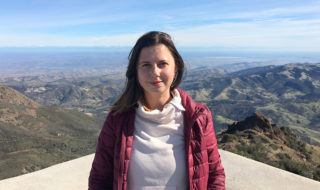
Vitaliia Yaremko is a Ph.D. student in the Department of Economics at UC Berkeley. (Photo courtesy of Vitaliia Yaremko)
Vitaliia Yaremko gets right to the point: The last year has been the hardest of her life.
Yaremko is completing her Ph.D in economics, with plans to graduate this spring. The timing of Russia’s invasion coincided with some of the most intense pressures during her studies. For a time, she doubted whether she’d graduate. She could barely function because everything at Berkeley seemed unimportant, given what was happening in the place where many in her family still reside — the place she calls home, no matter where she lives.
It’s been “a year of shock, pain and grief, but also acceptance, hope and resolve,” she said. Since the first days of the invasion, Yaremko’s parents, like millions of Ukrainians, have been supporting the Ukrainian army and people in need with donations. They’ve only occasionally admitted how difficult the year has been.
“Despite the shock, they have stayed strong and adjusted to the situation to the best of their ability,” she said. “Of course, the most challenging part was learning to live in the uncertainty about the imminent danger of missile attacks and resisting despair, despite the shocking news.”
Yaremko credits her advisers with giving her the resolve to stay on track. And in her studies this past year, she also found some degree of renewed purpose.
Yaremko’s research is on the early 20th century anti-market Soviet Union repressions in Ukraine, a period in which Soviet leaders starved some 4 million people. Her work shows that the economic consequences of those actions laid the groundwork for events that unfolded some 60 years later. It can even help people understand why Ukrainians are fighting so hard a year into the war: “They know that whenever Russia comes to power,” she said, “it is ruthless.
“They hoped to break the Ukrainian spirit with atrocities in captured cities, incessant missile attacks, and cruelty toward civilians and war prisoners, but they failed. They united Ukrainians more than ever, and it will stay this way.”

From left: Vitaliia Yaremko, her cousin and her aunt wearing traditional Hutsul clothes in summer 2006. Hutsuls are an ethnic group of western Ukraine. (Photo courtesy of Vitaliia Yaremko)
Once a refugee, he just took the bar exam
Like Tymoshchenko, Arsen Kulyk was studying last year as part of Berkeley Law’s Master of Laws program for foreign lawyers. He had a private practice and worked for ELEKS, a Ukrainian tech company. In the days before the Russia invasion, he and his family fled to Poland. He expected conflict — not the cruelty of a full-fledged war.
In Rzeszow, about an hour’s drive west of the Ukraine border, he would wake before dawn and study for his Berkeley courses. Then in May, he traveled to Berkeley where, in addition to his studies, he helped organize a Berkeley Law event about the conflict in Ukraine. The title of his session? “How the war is reaching you everywhere.”
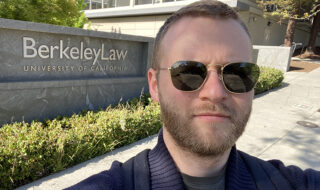
Arsen Kulyk fled from his home in Ukraine shortly after Russia’s invasion. While helping coordinate relief efforts, the Berkeley Law student moved to California in May and graduated in December. (Photo courtesy Arsen Kulyk)
He said he was especially moved by the thoughtful questions from those in attendance. Some students in the audience sent the recording to their families to raise awareness about the war.
He graduated in December. He then turned some of his attention to a charity fund that he and Tymoshchenko started to raise funds for the war effort. During the past three months, studying for the California Bar Exam consumed most of his time. He took the exam last week.
Kulyk, his wife and daughter now live in Walnut Creek, far from their Ukrainian homeland.
“We can’t really imagine our lives in a wartime country,” Kulyk said. “We never experienced power outages, air raids, hiding in the bomb shelter — and all the terrible inconveniences that our friends and relatives in Ukraine experience daily.”
Absent a full-on assault against Russia, Kulyk doesn’t see the war ending anytime soon.
“Now, all Ukrainians home and abroad are asking for just one thing: more weapons for Ukraine,” he said. “Tanks, fighter jets and ammo are the only things any Ukrainian dreams about now.”
‘I must win this war before I return to Berkeley’
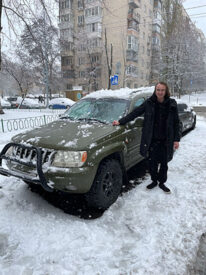
Ukrainian attorney Dmytro Tymoshchenko was a Berkeley Law student living in Ukraine before the war began. He has since helped raise funds and deliver equipment to the front lines, including this SUV paid for, in part, with donations from the Berkeley community. (Photo courtesy Dmytro Tymoshchenko)
Kulyk’s counterpart, Tymoshchenko — the man who traded textbooks for radiation detectors — was in the final year of his Berkeley Law program before withdrawing last spring. During the nighttime curfew that followed the invasion, he continued his legal work for New York-based Depositphotos, which provides royalty-free media, and VistaCreate, an online graphic design platform. During the day, he supported military operations. With many friends fighting on the front lines, he said, all but one was wounded by Russia’s attacks.
Though he and Kulyk were thousands of miles apart, they spent much of last year working together. Their group, Freedom, Then Peace, has collected more than $119,000 to support the Ukrainian army and driven more than 5,200 miles spanning the southern and eastern front lines to distribute drones, radios, optics and even vehicles.
Tymoshchenko said the work has been “one of my best experiences in life. Besides traveling and networking, this is the direct path to build our country and democracy for our future children.”
It’s come at a cost, though: He recently withdrew from this semester. But make no mistake, he said, he will complete his degree.
“We are expected to remain at home and work for the victory, and we all may be called for duty one day,” Tymoshchenko said. “Thus, I must win this war before I return to Berkeley.”
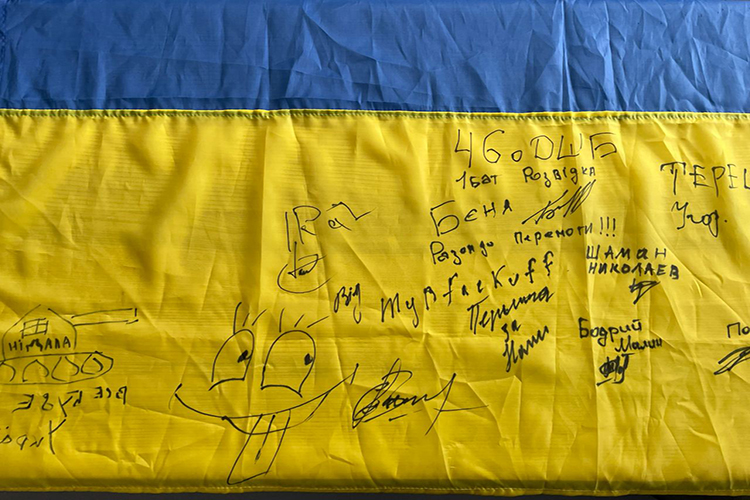
Members of a military brigade gifted Dmytro Tymoshchenko a flag adorned with messages and call signs. Ukrainian President Volodymyr Zelensky presented a flag from the same brigade to Congress during a speech in December 2022. (Photo courtesy Dmytro Tymoshchenko)